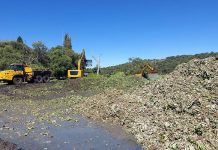Dordrecht sheep and cattle farmers Bernard and Jan Cloete of Thysfontein farm are victims, like many farmers, of the inefficiency of government departments, whom they pay for services that aren’t performed. One such department is the Workmen’s Fund, which falls under the Commission and its associated legislation, and is managed by the Department of Labour.
The fund’s mandate is to protect the rights of workers injured on duty, thus protecting employers from civil action. employer pays for the insurance and workers are meant to be compensated for any working time lost as a result of injury. Any medical expenses employers incur are paid back to them.
“Every year I have to fill in the return of earnings form sent by the compensation commissioner, stating the wages paid to my staff, plus any free housing and the value of produce given to them,” says Bernard. “year 2006 came and went and after filling in the form and returning it, I received no account of the money I owed. Up until 22 2008 I had not received the assessment for 2007 either. Without the assessment I have no idea how much to pay in.” Return of earnings According to a clause on the return of earnings form (W.As.8), a penalty not exceeding 10% of the final assessment may be imposed on the employer if the form is not submitted to the labour office on or before 31 March of the current year. second clause states that the W.8 is mailed to all registered employers in January each year. If it is not received, the responsibility falls on the employer to notify the commissioner by 15 February.
The forms are also available on a website. “I received a final demand from the Workmen’s Compensation Fund on 25 April 2008 for two outstanding payments,” says Bernard. “It clearly states I owed an outstanding amount payable within 30 days of the account being printed – which worked out as 1 March! I had also been charged 10% interest on the whole outstanding amount. “The fund really needs to get itself organised and up to date. If they don’t send out accounts for two years, how can I be expected to pay interest? There was no way for me to work out my assessment. The final demand had arrived 25 days after the payment was due and it states additional interest of R2,35/day will be charged after 1 March 2008.”
Failure to pay out Another problem, according to Bernard, is the non-payment of injury on duty (IOD) accounts sent out by the hospitals that treated the injured workers. “For two years I received accounts of final demand from a hospital in East London, which held me liable following an employee’s back injury,” says Bernard. Merino and cattle farmers Ade and Lez Larter of Dordrecht have had similar experiences at the Dordrecht Memorial Hospital. “One of our workers was rounding up stock on a horse when he fell off and broke his collarbone,” says Ade. “The hospital couldn’t get its money from Workmen’s Compensation so it started sending us the account. We refuse to pay because we already pay into the fund each month.” Lez says this is not an isolated incident. “I have lists of cases where Workmen’s Compensation hasn’t paid but continues to send forms.
This year I was so furious when I received their form, I sent it back to them along with all the unpaid hospital accounts.” According to a source at the Dordrecht Memorial Hospital, those same accounts are also being sent to Workmen’s Compensation. “We’ve never asked the farmers to pay the accounts, but we want them to put pressure on Workmen’s Compensation for the accounts to be settled,” explained the source, who wishes to remain anonymous.
The situation is so hopeless the Dordrecht Memorial Hospital is considering handing the accounts over for legal action. “We really have a problem, we’ve got accounts that are two years’ outstanding,” says the source. “I’ve heard that there’s only one orthopedic surgeon in East London prepared to take on Workmen’s Compensation cases. But what can we do? We can’t refuse patients. That would be unethical.” Delay in payments costs SA labour “The reason for many of the delays is that there is only one Workmen’s Compensation office in Pretoria and it handles all the claims,” says Paula Howell, a legal assistant at Voster, Du Plessis Attorneys.
“The Workmen’s Compensation legislation is there to protect employers from civil claims arising from injury. But it also has to guarantee employees get a speedy, quality health service.” According to Paula, the late payment of accounts results in many employees being permanently prevented from working again. “They don’t always receive the proper rehabilitation, so the scheme in effect contributes to a reduced workforce.” She says that many doctors resort to taking the legal route against Workmen’s Compensation to get their accounts settled. “Thousands of claims are settled that way,” says Paula. “I’m not sure all the amounts paid to the hospitals are even calculated correctly by the fund. I think they just want to get rid of the pending legal suits.
” What Workmen’s Comp needs from you But according to Uma Mackay, an entrepreneur who works between Workmen’s Compensation and employers to smooth the compensation process, the fund has to process a huge amount of claims each day. “Employers need to know the procedure and correct documentation that should be attached before sending them to their nearest labour centre or Pretoria,” says Uma. “Workmen’s Compensation sometimes waits for weeks to receive crucial documents such as the First Medical Report (W.Cl.4), to determine if claims for medical costs are justified.
Without the right documents decisions can’t be made and the accounts can’t be paid. Employers should follow up on IOD cases on a weekly basis. Making sure the documents are completed correctly and the injury fully explained by the employer’s safety officer, and a full clinical description of the injury by the doctor, speeds up the process and the acceptance of claims, which results in accounts being paid.” But for farmers like Bernard and Jan and Ade and Lez, the inefficiencies of the fund continue to frustrate.
“The money we’re paying seems to go nowhere,” says Bernard. “I sometimes think we’re inclined to take the route of least resistance for the sake of our blood pressure and just pay up.” E-mail the Compensation Commission at [email protected] or visit www.labour.gov.za. |fw








